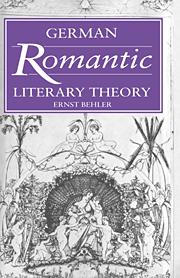Book contents
- Frontmatter
- Contents
- Preface
- List of abbreviations
- Chronology of early Romanticism
- Introduction
- 1 Formation and main representatives of early Romanticism in Germany
- 2 Poetry in the early Romantic theory of the Schlegel brothers
- 3 The theory of Romantic poetry
- 4 Novalis and the mystical dimension of early Romantic theory
- 5 Wackenroder's and Tieck's conceptions of painting and music
- 6 Theory of language, hermeneutics, and encyclopaedistics
- Conclusion: early German Romanticism and literary modernity
- Notes
- Select bibliography
- Index of works cited and primary sources
- Index of subjects and names
Introduction
Published online by Cambridge University Press: 17 August 2009
- Frontmatter
- Contents
- Preface
- List of abbreviations
- Chronology of early Romanticism
- Introduction
- 1 Formation and main representatives of early Romanticism in Germany
- 2 Poetry in the early Romantic theory of the Schlegel brothers
- 3 The theory of Romantic poetry
- 4 Novalis and the mystical dimension of early Romantic theory
- 5 Wackenroder's and Tieck's conceptions of painting and music
- 6 Theory of language, hermeneutics, and encyclopaedistics
- Conclusion: early German Romanticism and literary modernity
- Notes
- Select bibliography
- Index of works cited and primary sources
- Index of subjects and names
Summary
The emergence of the early Romantic theory of literature in Germany towards the end of the eighteenth century constitutes a decisive turning-point in the history of criticism. Incited by Lessing, Herder, and Schiller, and stimulated by Goethe's poetic creations, a new view of the literary work and the artistic process developed that differed sharply from the dominant classicist understanding of aesthetics and poetics. The European classicist tradition had stressed unchangeable norms for art, codified a hierarchical system of immutable genres, bound artistic production to an imitation of nature and an adherence to verisimilitude, and defined poetic unity according to strict rules. The early Romantic critics made decisive inroads into this classicist view of poetry by recognizing the infinite changeability of genres, their constant mixing and mingling, as well as the frequent emergence of new literary forms. They saw the poetic unity of a literary work as an inner conformity with itself, connecting a multiplicity of phenomena to a unity of its own. This task of redefinition, however, could not be accomplished by applying external rules, but was instead to be carried out by the shaping power of the imagination.
Given these features, early Romantic literary theory seems to be closely related to transcendental idealism, the prevailing philosophy of the time. In his Critique of Judgment of 1790 Kant laid the foundations for the autonomy of art, and for the uniqueness and distinctiveness of aesthetic, as opposed to scientific and moral judgments, thus decisively changing the ground rules in the debate about art and the beautiful that had prevailed in European criticism for centuries. Other decisive impulses came from Fichte and Schelling.
- Type
- Chapter
- Information
- German Romantic Literary Theory , pp. 1 - 12Publisher: Cambridge University PressPrint publication year: 1993



